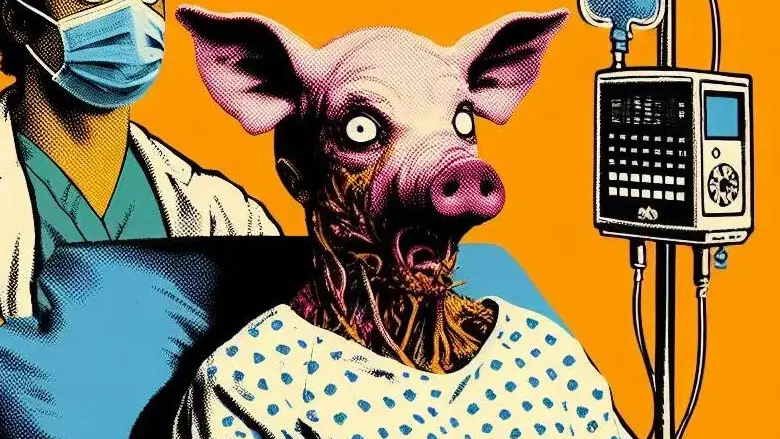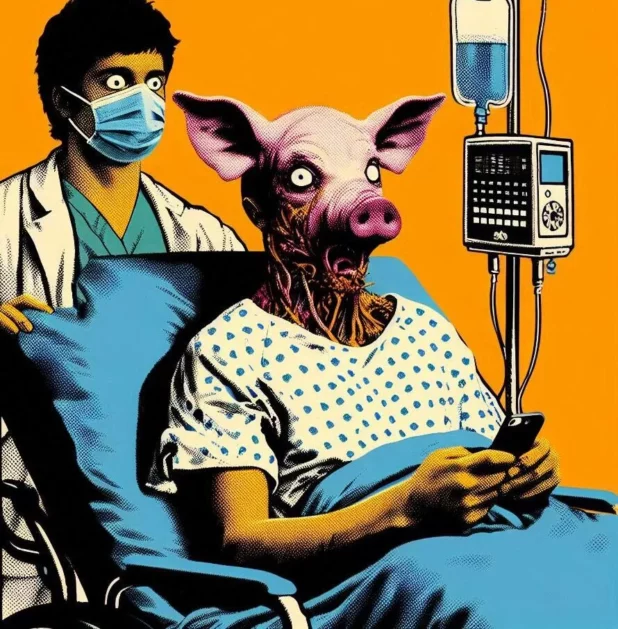What is it worth to get a few more years on your life?
Would you be willing to become part pig? An amalgamation?
I once read a novel, it was old, maybe from the 1930s or before, about a man who lived on an old farm, and there were ancient passages under his land, with some ancient evil living there, and his house was constantly getting raided at night by pig people. I don’t remember the name of it. I don’t think the author was particularly famous and was sort of doing his own take on HP Lovecraft and Ambrose Bierce (both of whom were much better than the writer of this story I’m talking about).
Anyway, I will always think of that when I think of pig humanoids.
I wouldn’t want to be a pig humanoid.
I’d rather die.
CNN:
For 66-year-old Tim Andrews, it was a matter of life or death.
Andrews had spent the better part of two years on dialysis because of end-stage kidney disease. He was on the transplant wait list for a new kidney, but his blood type made it particularly difficult to find a donor organ.
The average wait time for a kidney is three to five years at most centers, but studies have found that people with type-O blood can wait as long as 10 years to receive a kidney. His chances of living five more years on long-term dialysis are just around 35%. His doctors estimated that he had about a 9% chance of getting an organ in the next five years.
Andrews said he had a “shortage of time.”
“It really becomes very, very depressing that this is it, you know? ” he recalls thinking. “This is how I’m going to end my life. I’m going to be going to dialysis and being tired.”
So Andrews didn’t hesitate when his doctors at Massachusetts General Hospital asked whether he would consider an experimental transplant using a kidney from a donor pig.
How could you not hesitate?
Nigga, you’re 66.
How long are you planning on going for? As a pig humanoid?
“All of a sudden, I’m not in the darkness. I’m going to get better. I am going to do this,” Andrews said in a hospital interview shared with journalists.
On Friday, doctors at Massachusetts General Hospital announced that Andrews had successfully received the pig kidney. The January 25 procedure took place through the US Food and Drug Administration’s Expanded Access pathway, often known as compassionate use, which allows patients with life-threatening conditions to access investigational medical products. He’ll be the first in a three-patient study and is the second person currently living in the world with a pig kidney.
The team at Massachusetts General used an organ developed by Cambridge, Massachusetts-based biotech company eGenesis.
“Our three-patient study this year will provide critical insights into the long-term viability of xenotransplants as a transformative solution for thousands of patients in need of a life-saving kidney,” Dr. Leonardo Riella, medical director for kidney transplantation at Massachusetts General Hospital, said in a statement.
🚨BREAKING: Our report on the first-ever pig kidney xenotransplant in a living human with ESRD is now published in @NEJM! A major milestone in transplantation, paving the way for a new era of organ replacement @mgh_transplant @MGHKidneys @eGenesisBio more: https://t.co/sdDOwUlsph
— Leonardo V. Riella (@LVRiella) February 7, 2025
The practice of transplanting animal organs into humans, known as xenotransplantation, has long felt like science fiction. However, in the past three years, half a dozen such procedures have taken place in the United States using pigs that have been genetically modified, so their organs are more compatible with humans’.
Using the gene-editing technique CRISPR, scientists can modify the pig’s DNA. eGenesis workers make more than 60 edits to help manage a host of potential issues including rejection, size of the organ and even pig retroviruses that could potentially infect humans.
Another biotech company, United Therapeutics, announced this week that it had received the green light from the FDA to move forward with a xenotransplant trial with its pig kidneys, which have 10 gene edits. The company expects to perform the first of six initial transplants in people with end-stage kidney disease in the middle of 2025, with the intent of expanding the trial to a total of 50 patients.
United Therapeutics expects pig kidney transplants to be an established option for patients by the end of this decade, spokesperson Dewey Steadman said.
If they can grow pig-humanoid organs, they could just as easily grow human organs from your cells.
But do we really need any of this?
Is death not a part of life? The most important part?
Towana Looney, the only person in the world with a functioning pig organ transplant, is thriving two months after the procedure.
Morgan Norwood has the update. pic.twitter.com/YNLv0DK0zv
— ABC News Live (@ABCNewsLive) January 26, 2025

